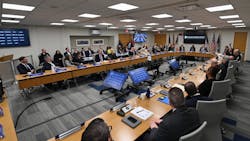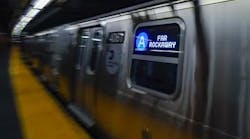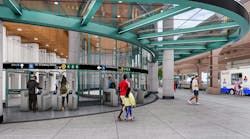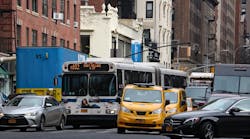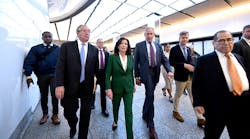The Metropolitan Transportation Authority (MTA) Board has approved Central Business District toll rates.
The approved toll rates align with rates recommended by the Traffic Mobility Review Board on Nov. 30, 2023, and put forward for public review by the MTA Board on Dec. 6, with a handful of clarifications provided.
The toll structure, also referred to as congestion pricing, includes a $15 per day rate for passenger vehicles and small commercial vehicles and between $24 and $36 day rate for trucks and some buses. Exemptions will be in place for authorized emergency vehicles, vehicles carrying people with disabilities and a 50 percent discount will be available for low-income vehicle owners.
Benefits of the Central Business District Toll Program include an anticipated reduction in congestion, improved air quality and revenue generation with the program expected to raise $1 billion annually for transit improvements.
“Today’s vote is one of the most significant the board has ever undertaken and the MTA is ready,” said MTA Chair and CEO Janno Lieber. “In advance of day one of tolling, we’ve increased service on 12 subway lines, advanced redesigns of the entire New York City bus network and implemented the largest service increase in [Long Island Rail Road] history and there’s more to come with the funds raised from congestion pricing – more accessible stations, modernized subway signals and new expansion projects like Phase 2 of the Second Avenue Subway and Metro-North Penn Station Access.”
While the vote is a step forward to implement the toll program, there are several lawsuits that could impact the timing of the program. The Central Business District Tolling Program could begin as early as June 2024. The program will begin with a 30-day testing phase and a 60-day public information campaign.
Reactions to the vote
In a statement, Regional Plan Association’s (RPA) President and CEO Tom Wright and Executive Vice President Kate Slevin praised the approval by the MTA Board.
"Regional Plan Association is thrilled to see the MTA board vote in favor of congestion pricing today, officially making New York the first state in the United States to implement a program of its kind,” Wright and Slevin said. “Congestion pricing will improve public transit, reduce air pollution and decrease traffic in our region and the capital created by congestion pricing is necessary to help keep trains, buses and commuter rails running reliably throughout the metropolitan region. Transit riders will benefit from this investment, as will our economy and environment and the safety of our streets. After decades of advocating for this program, RPA sees this as a historic day.”
New Jersey Gov. Phil Murphy opposes the MTA’s Board approval.
"This is far from over and we will continue to fight this blatant cash grab. The MTA’s actions today are further proof that they are determined to violate the law in order to balance their budget on the backs of New Jersey commuters. We will continue to avail ourselves of every option to protect residents on this side of the Hudson from an unfair tolling scheme that discriminates against New Jerseyans, especially lower and middle-income drivers," Gov. Murphy said in a statement.
U.S. Rep. Josh Gottheimer (D-NJ-5) echoed the sentiments of Gov. Murphy.
“Today’s vote was just a rubber stamp on the MTA’s unprecedented cash grab. It just proves what we knew all along — the MTA doesn’t care about less traffic, helping the environment or supporting families. They will do anything to cover their historic mismanagement — and the billions of dollars they bleed out every year. Today, they ignored the voices of thousands of families who begged them to do the right thing,” Gottheimer said in a statement.
Full details of the toll rates are available at MTA’s website.

Brandon Lewis | Associate Editor
Brandon Lewis is a recent graduate of Kent State University with a bachelor’s degree in journalism. Lewis is a former freelance editorial assistant at Vehicle Service Pros in Endeavor Business Media’s Vehicle Repair Group. Lewis brings his knowledge of web managing, copyediting and SEO practices to Mass Transit Magazine as an associate editor. He is also a co-host of the Infrastructure Technology Podcast.
